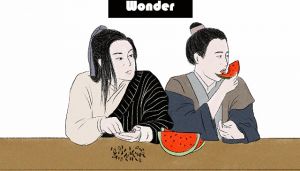“Eating Melons”的版本间的差异
来自China Digital Space
| 第52行: | 第52行: | ||
Consuming the latest gossip, from a distance. Incidents become meme-like "melons," which are then "eaten" by those following along on the internet. As opposed to "[[surround and watch]]," which implies the application of scrutiny to events of public interest, "eating melons" connotes the private enjoyment of drama, a la "[https://www.bustle.com/p/what-is-the-kermit-sipping-tea-meme-a-history-of-this-muppets-shade-69015 sipping tea]" in American parlance. "Eating melons" became a sensitive word in 2021. | Consuming the latest gossip, from a distance. Incidents become meme-like "melons," which are then "eaten" by those following along on the internet. As opposed to "[[surround and watch]]," which implies the application of scrutiny to events of public interest, "eating melons" connotes the private enjoyment of drama, a la "[https://www.bustle.com/p/what-is-the-kermit-sipping-tea-meme-a-history-of-this-muppets-shade-69015 sipping tea]" in American parlance. "Eating melons" became a sensitive word in 2021. | ||
| − | The phrase | + | The phrase's etymology begins in 2016. Users on Baidu's Tieba network had long pretended to be hawkers in the comment section, selling "melon seeds" to other commentators. The phrase was combined with a recurring phrase in official media, "the ignorant public," to create "the ignorant melon-eating public." Although the phrase had strong political overtones at first, its adoption by China's internet fandoms smoothed its edges. By 2017, state media was using the phrase mockingly. After Nobel laureate Liu Xiaobo died in police custody in 2017, [https://www.ft.com/content/b6d56066-6847-11e7-8526-7b38dcaef614 Global Times wrote] that it would stay up all night "eating melons with the public," in apparent glee. |
| − | + | The popularity of "eating melons" took of again in early 2021 during a series of celebrity scandals, most notably a [https://chinadigitaltimes.net/2021/01/celebrity-scandal-inspires-reflection-on-surrogacy-in-china/ controversy over a famous actress' surrogacy and tax fraud]. For a time, a mobile game with a tongue-in-cheek title nodding at the phrase, "[https://www.globaltimes.cn/page/202102/1214625.shtml Combine Big Watermelons]" was among the most popular games in China. A crackdown on celebrities and their fandoms later in the year saw a number of online groups dedicated to "eating melons," [https://www.protocol.com/workplace/airtable-future most notably Goose Group], disbanded by censors. | |
| − | |||
| − | The popularity of " | ||
2021年11月10日 (三) 02:00的版本
Chī Guā | 吃瓜

Consuming the latest gossip, from a distance. Incidents become meme-like "melons," which are then "eaten" by those following along on the internet. As opposed to "surround and watch," which implies the application of scrutiny to events of public interest, "eating melons" connotes the private enjoyment of drama, a la "sipping tea" in American parlance. "Eating melons" became a sensitive word in 2021.
The phrase's etymology begins in 2016. Users on Baidu's Tieba network had long pretended to be hawkers in the comment section, selling "melon seeds" to other commentators. The phrase was combined with a recurring phrase in official media, "the ignorant public," to create "the ignorant melon-eating public." Although the phrase had strong political overtones at first, its adoption by China's internet fandoms smoothed its edges. By 2017, state media was using the phrase mockingly. After Nobel laureate Liu Xiaobo died in police custody in 2017, Global Times wrote that it would stay up all night "eating melons with the public," in apparent glee.
The popularity of "eating melons" took of again in early 2021 during a series of celebrity scandals, most notably a controversy over a famous actress' surrogacy and tax fraud. For a time, a mobile game with a tongue-in-cheek title nodding at the phrase, "Combine Big Watermelons" was among the most popular games in China. A crackdown on celebrities and their fandoms later in the year saw a number of online groups dedicated to "eating melons," most notably Goose Group, disbanded by censors.
In November 2021, the phrase briefly became a sensitive word after tennis star Peng Shuai accused former Politburo Standing Committee member Zhang Gaoli of sexual assault. Weibo users adopted "eating melons" and "gigantic melon" as stand-ins for discussions about Peng's plight in a vain attempt to evade censors. The terms was then censored. Although many took illicit joy in the cheeky discussion of "melons," others were dismayed by the corruption of language inherent in the phrases' adoption. "When a heart-wrenching accusation becomes a meme like 'a melon we commoners can’t eat,' they’ve already won," wrote on Douban user.
See Also
More from CDT




